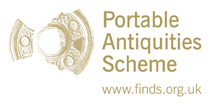File:Roman steelyard weight (FindID 568924).jpg

Original file (1,895 × 1,727 pixels, file size: 652 KB, MIME type: image/jpeg)
Captions
Captions
Summary
edit| Roman steelyard weight | |||
|---|---|---|---|
| Photographer |
All rights reserved, Adrian Marsden, 2013-07-13 13:19:38 |
||
| Title |
Roman steelyard weight |
||
| Description |
English: Very large, lead-filled copper alloy steelyard weight in the form of a quarter-length bust of a boy satyr, height approximately 92mm, weight 862g . His long hair is gathered up in a Harpocrates-style top-knot worn widely by children whilst two thick curls run down each side of his head. Four curls run down the back of his neck above the lead filling. There is iron staining behind the topknot, all that remains of the iron loop from which the steelyard weight would have suspended. The face is damaged, the nose and right eye having broken off, presumably due to expansion of the iron and lead that filled the head.,
This is one of the larger steelyard weights from Roman Britain, being parallelled by only a few others, a head of Silenus from Richborough (Richborough IV, pp.125-6 and plate XLII, no. 159) and a female head from Kingscote villa. Ralph Jackson (pers. comm.) has advised that the British Museum has two Maenads from Great Chesterford, Essex (1865,0408.12 at 2347g) and Nursling, Hants (1856,0701.5090 at 2361g), a boxer (1856,0701.5091 at 1200g) and a male head, perhaps a philosopher from the City of London (1934,1210.1 at 6812g). None on the PAS database approach it in size. Close dating of steelyards is not easy but this example probably belongs in the second century. Bought at a Burgh Castle car boot sale in the mid 1990s from a seller who had no knowledge of what the item was. Probably a local find and almost certainly from the general area of central eastern East Anglia. |
||
| Depicted place | (County of findspot) Norfolk | ||
| Date | between 100 and 200 | ||
| Accession number |
FindID: 568924 Old ref: NMS-FE90E7 Filename: steelyard6.JPG |
||
| Credit line |
|
||
| Source |
https://finds.org.uk/database/ajax/download/id/433113 Catalog: https://finds.org.uk/database/images/image/id/433113/recordtype/artefacts Artefact: https://finds.org.uk/database/artefacts/record/id/568924 |
||
| Permission (Reusing this file) |
Attribution-ShareAlike License version 4.0 (verified 5 December 2020) | ||
| Object location | 52° 35′ 16.08″ N, 1° 39′ 50.51″ E | View this and other nearby images on: OpenStreetMap |
|---|
Licensing
edit- You are free:
- to share – to copy, distribute and transmit the work
- to remix – to adapt the work
- Under the following conditions:
- attribution – You must give appropriate credit, provide a link to the license, and indicate if changes were made. You may do so in any reasonable manner, but not in any way that suggests the licensor endorses you or your use.
- share alike – If you remix, transform, or build upon the material, you must distribute your contributions under the same or compatible license as the original.
File history
Click on a date/time to view the file as it appeared at that time.
| Date/Time | Thumbnail | Dimensions | User | Comment | |
|---|---|---|---|---|---|
| current | 00:52, 29 January 2017 |  | 1,895 × 1,727 (652 KB) | Fæ (talk | contribs) | Portable Antiquities Scheme, NMS, FindID: 568924, roman, page 3280, batch count 3319 |
You cannot overwrite this file.
File usage on Commons
The following 6 pages use this file:
- File:Roman steelyard weight (FindID 568924).jpg
- File:Roman steelyard weight (FindID 568924-433107).jpg
- File:Roman steelyard weight (FindID 568924-433108).jpg
- File:Roman steelyard weight (FindID 568924-433109).jpg
- File:Roman steelyard weight (FindID 568924-433110).jpg
- File:Roman steelyard weight (FindID 568924-433112).jpg
Metadata
This file contains additional information such as Exif metadata which may have been added by the digital camera, scanner, or software program used to create or digitize it. If the file has been modified from its original state, some details such as the timestamp may not fully reflect those of the original file. The timestamp is only as accurate as the clock in the camera, and it may be completely wrong.
| Camera manufacturer | Canon |
|---|---|
| Camera model | Canon PowerShot SX120 IS |
| Exposure time | 1/1,250 sec (0.0008) |
| F-number | f/4 |
| ISO speed rating | 80 |
| Date and time of data generation | 05:18, 31 January 2011 |
| Lens focal length | 6 mm |
| Orientation | Normal |
| File change date and time | 05:18, 31 January 2011 |
| Y and C positioning | Co-sited |
| Exif version | 2.21 |
| Date and time of digitizing | 05:18, 31 January 2011 |
| Meaning of each component |
|
| Image compression mode | 3 |
| APEX shutter speed | 10.28125 |
| APEX aperture | 4 |
| APEX exposure bias | 0 |
| Maximum land aperture | 2.96875 APEX (f/2.8) |
| Metering mode | Center weighted average |
| Flash | Flash did not fire, compulsory flash suppression |
| Digital zoom ratio | 1 |
| White balance | Auto white balance |
